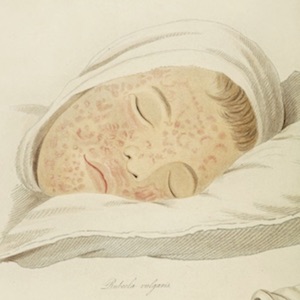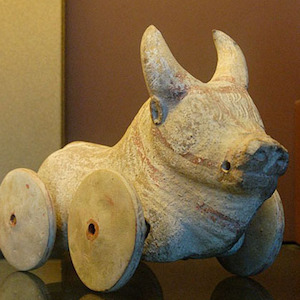Children

Immigrant Crossing Road Sign
Interstate 5 runs from the Mexican/U.S. border crossing at San Ysidro, California, to the Peace Arch Crossing into Canada at Blaine, Washington. This official yellow warning road sign is posted along Interstate 5 near the San Ysidro crossing and north of San Diego.

Postcard of Women and Girls with Cradleboard, Temuco, Chile
This postcard, from the early 20th century, shows a group of women and children, most likely belonging to the Mapuche people. The Mapuche occupied a large area in the cone of South America, the territory of the current nations of Chile and Argentina.

Birth Rituals in the Codex Mendoza
The image from the Codex Mendoza (produced ca. 1535-1550) describes the Aztec birth ritual of bathing and naming the child, which, according to accounts from the 16th century, was usually held on the fourth day after birth.

Aztec Cradleboard Figurine and Drawing
The ceramic figurine of an infant in a cradle (also called a cradleboard) was created by the Nahua, or Aztec people of Mexico, between 1350 and 1521 CE.

Rubeola Vulgaris - Measles
Robert Willan (1757-1812) was a physician who practiced in London. Like Sydenham he was fascinated by the relation of weather to epidemics and kept strict records on when they occurred over several years.

Age of Menarche in Norway
This graph shows us the average year of menarche, a female's first menstrual cycle (often considered the beginning of puberty), from 1860 to 1980 reported by adult female patients at maternity clinics in Norway.

Buffalo on Wheels Toy
This object made from terracotta was most likely a child's pull toy. Approximately 11 centimeters high and 16.5 centimeters long (4.3 x 6.5 inches), it features functional wheels and a hole at the mouth for a string.

Emile
French philosopher Jean-Jacques Rousseau wrote the philosophical treatise Emile, or On Education in 1762. In it, he imagines a situation in which a young tutor devotes 20 years to raising a single child.

Linen Towel with Indigo Woven Border
Italian noblewomen presented soft, absorbent, linen towels with indigo woven borders to birthing mothers during the 14th century and later.

Native American Children and Toys
Theodore de Bry included this colorful engraving in his publication of Hariot's, A Briefe and True Report of the New Found Land of Virginia (1590). It was based on a watercolor by John White (fig. 2) painted five or six years earlier.